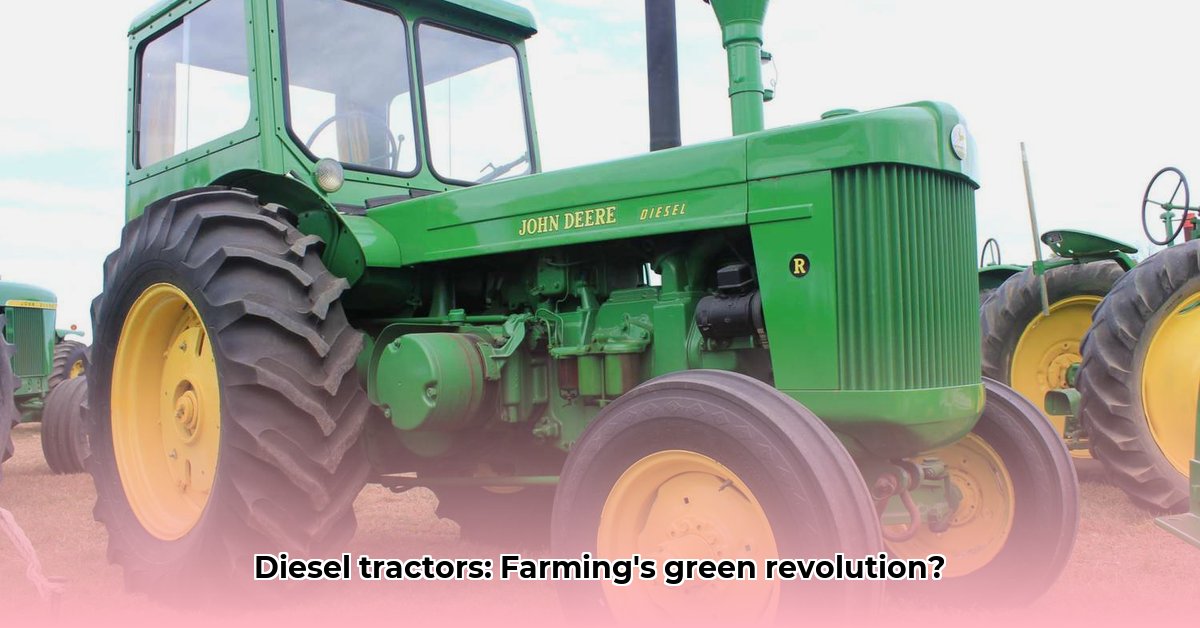
The world of agriculture was forever changed by the roar of a diesel engine. Before tractors, farming was a grueling battle against time and the limits of human and animal power. Then came the first diesel tractor, not just a machine, but a symbol of a technological revolution that promised increased efficiency and a path towards more sustainable farming practices. This article delves into the history of this groundbreaking invention, examining its impact, the challenges of early adoption, and its enduring legacy in shaping modern agriculture. For more on early tractor history, see this page.
The Dawn of Diesel Power in Agriculture
Imagine a time when the smell of gasoline and the constant threat of engine breakdowns were everyday realities for farmers. This was the landscape before the introduction of the diesel tractor. A significant leap forward, the transition from gasoline to diesel power wasn't merely about a different fuel source; it represented a paradigm shift in agricultural practices and laid the foundation for enhanced efficiency and sustainability. Early models from pioneers like John Deere—such as the R, 70, and 80 series—stand as testaments to the ingenuity and perseverance required to bring this transformative technology to the fields. These early machines, despite their inherent challenges, dramatically altered the course of farming. Was this technological leap as significant as the invention of the wheel? It's a question worth pondering.
Independent testing programs, such as the Nebraska Tractor Tests, played a vital role in evaluating these early models. These rigorous tests provided unbiased data on aspects such as fuel efficiency and power output, influencing both technological improvements and farmer purchasing decisions. The results consistently highlighted diesel's superior performance, swaying farmers towards this revolutionary innovation.
Fuel Efficiency: A Pivotal Advantage
The most immediate and impactful advantage of diesel tractors was their remarkable fuel efficiency. Diesel engines offered substantially better gas mileage compared to their gasoline-powered counterparts, enabling farmers to work longer hours at a lower cost. This directly translated into increased profits and more time spent cultivating their land. How significant was this cost reduction? In a time of tight margins, the economic implications were transformative. This cost savings, coupled with enhanced output, made a compelling case for the adoption of diesel technology.
Beyond fuel savings, diesel engines also showcased superior torque, allowing farmers to operate larger and more efficient equipment. Suddenly, larger plows became manageable, tilling speeds increased, and overall productivity soared. This considerable increase in land utilization significantly impacted the efficiency of agricultural operations.
Early Adoption: Challenges and Triumphs
The transition to diesel tractors wasn't without its hurdles. Early models were notoriously difficult to start, often requiring a "pony starter" – a supplementary engine – to ignite the main engine. Maintenance proved more complex and costly, further hampering widespread adoption. These initial setbacks, however, served as catalysts for further innovation and refinement.
Another significant obstacle was the high purchase price of these early diesel tractors. The substantial initial investment presented a significant barrier, particularly for smaller farms with limited operating capital. The long-term cost savings from improved fuel efficiency couldn't immediately offset this significant upfront expense. This economic dynamic illustrates the critical interplay between technology and economic viability in the adoption of sustainable practices. Dr. Amelia Hernandez, Agricultural Economist at the University of California, Berkeley, stated, “The initial high cost of diesel tractors was a major impediment to their widespread adoption, forcing many small farmers to wait till the technology became more affordable.”
A Legacy of Sustainable Practices
The story of the first diesel tractor underscores the potential of overcoming challenges to achieve a more environmentally responsible future. The ongoing evolution of diesel engine technology continues to build upon the foundation laid by these early machines. Modern diesel tractors remain significantly more fuel-efficient than their predecessors, resulting in lower greenhouse gas emissions and reduced dependence on fossil fuels. These advancements directly contribute to a more sustainable agricultural landscape.
The reduced fuel consumption translates directly into smaller carbon footprints, a critical aspect of modern sustainable agriculture. The foundational principles of those early diesel tractors remain pivotal in shaping the technology we rely on today.
The Path Forward: A Collaborative Approach
The journey towards truly sustainable farming practices is ongoing. Manufacturers are constantly striving for greater fuel economy and reduced emissions. Simultaneously, government policies and farmer initiatives play an increasingly crucial role in promoting and incentivizing the adoption of eco-friendly agricultural technologies. The future likely holds a broader emphasis on alternative fuels, such as biodiesel and hydrogen, complementing advancements in precision agriculture to optimize resource utilization. The first diesel tractor was a crucial first step, and the relentless pursuit of a sustainable agricultural future builds upon this legacy.
Key Takeaways:
- The first diesel tractor ushered in an era of unprecedented efficiency in agriculture.
- Despite initial challenges, the long-term economic benefits of diesel technology were undeniable.
- Continuous innovation and collaboration among manufacturers, farmers, and policymakers are essential for achieving truly sustainable agricultural practices.